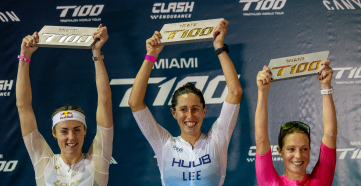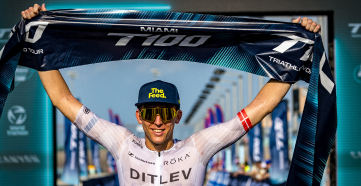The last couple of years have been anything but straightforward for Fenella Langridge.
The global COVID-19 pandemic has made training, racing and travelling to events at best a headache, at worst impossible.
2021 has started in a similar fashion for the British star, which means warm-weather training camps in the Canary Islands have been exchanged for the UK’s much chillier climate.
Virtual training apps and icy roads have replaced conventional coaching and the Mediterranean heat, leaving Fenella, #35 in the latest PTO World Rankings, in a completely unfamiliar situation.
“For the last four years we have been in Lanzarote, and then a bit later we would head to Majorca for a few months,” she said in an interview with the Inside Tri Show Podcast.
“We Brits are all in the same boat, lots of Zwift-ing, the running is really different, wrapping up warm to go out.
“You just have to be a bit cautious riding a bike outside because of the weather, you might slip on ice, so you have to take a bit more precautions.”
Several athletes managed to travel to Dubai to continue preparations for the 2021 season – something Fenella and her boyfriend Billy had considered prior to the latest lockdown taking full hold in the UK.
“We did look at going to Dubai like some others have but weighing up costs, logistics and maybe a bit moral – was it the right thing to be doing at this time of year.
“Bill and I just thought we have got an escape room; we are lucky we have actually got access to a pool, we are lucky enough to have the pool in Bath where I can train with the likes of Vicky Holland and India Lee.
“If we didn’t have access to that pool, it might be a different story.”

Bright spots
Positives were difficult to take from 2020 for many people around the world, but Fenella was keen to focus on one upside, namely uninterrupted training.
“I think I looked at it a day at a time, didn’t try and look at the bigger picture, so you wake up, what have I got to do today? What’s the next session rather than aiming for that three-month, four-month cycle
“In a way, taking out races in 2020, you could have a year of uninterrupted training.
“You could just keep going, go easy at times, go a bit harder at times, but just keep ticking over and keep building on what you have done going into 2021.”
Despite the pandemic putting any future plans in doubt for now, Fenella was proud of how she dealt with the unprecedented situation, staying focused on her long-term goals.
“Nothing really changed for me, I just kept going. Maybe that shows I am quite resilient, and I just enjoy swim, bike and running,
“Each step you do in that one day will hopefully take you where you want to go in the future.”
While 2020 may have been disrupted, 2019 had been an even more painful experience for Fenella. Physically at least.
First of all, she needed stitches after falling off her bike during the first race of the season.
Such was her strength of character, she bounced back after just a week to claim victory at 70.3 Barcelona. She would then need a lengthier recovery period after an accident at CHALLENGEMALLORCA.
“For me, 2019 was harder than 2020, I broke my foot and my collarbone.
“When doing the rehab and trying to get back, (I learnt) about the small steps each day and leading to the bigger picture of getting fitter.
“So yeah, maybe that’s when I learned it (to be resilient) and that carried on into 2020.”

Pain barrier
Fenella’s resilience would be tested once again late last year, as she suffered a torn calf just four weeks prior to the PTO 2020 Championship at CHALLENGEDAYTONA®.
She believes the injury did hamper her race, though she still produced a highly creditable performance to finish seventh in one of the deepest fields ever assembled by the sport.
After a rapid swim, Fenella found herself in third position and showed consistent pace throughout the day as she remained within the top 10 for the duration of the race.
Despite her injury, she completed the 100km event in a time of 3:33:42, just under four minutes away from a podium finish.

Money matters
That excellent performance in Florida saw Fenella earn $23,000 in prize money, which was a massive boost.
“I’m getting a little bit closer to making a living from triathlon this year, but still I think I’ve broken even if you look at the accounts, maybe made a little bit,” she explained.
Fenella hopes that as triathlon grows in popularity, there will be more financial support for the athletes who dedicate their lives to the sport.
“It’s not a lucrative career to be in, but hopefully as triathlon progresses and it becomes more popular and hopefully the UK public and companies get behind it as well.
“Especially with 70.3 or long-distance, we’ll see a greater demand and hopefully a bit of publicity for triathlon and obviously it would become more financially rewarding in that respect.”
It is not prize money which motivates Fenella though, it is merely a necessity for her to continue competing in the sport that she loves.
“Money won’t ever be the driver for me, I didn’t even know how much money I’d won until a couple of days after Daytona, it’s not something that drives me to keep going,” she commented.
“It obviously helps and I can actually attend races and go on camps like that – and I would like to think more about the future and whatever that might look like and being a bit more secure in that respect.
“But that’s all it would be for. It’s not to buy flashy cars, or shoes, or rings or whatever.”
Fenella reiterated that athletes are not looking for huge cash prizes – they just hope for a stable income so they can train and compete without the worry of financial insecurity.
“Companies have a lot of money, and I don’t think they realise it is not a lot of money that we as triathletes are after.
“We just need a basic minimum-wage salary to give us that security to feel confident and comfortable and to do a job we actually enjoy doing.”


















